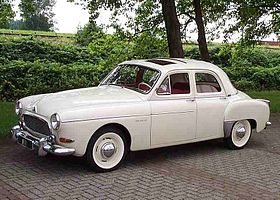Renault Frégate
| Renault Frégate Renault Domaine Renault Manoir |
|
|---|---|

1959 Renault Frégate
|
|
| Overview | |
| Manufacturer | Renault |
| Production | 1951-1960 |
| Assembly | Flins, France[1] |
| Body and chassis | |
| Class | Executive car (E) |
| Body style | 4-door saloon (Frégate) 5-door estate (Domaine & Manoir) |
| Layout | FR layout |
| Powertrain | |
| Engine | 1996 cc straight-4 2141 cc Etendard straight-4 |
| Transmission | 4-speed manual semi-automatic 3-speed, optional from 1957 |
| Dimensions | |
| Wheelbase | 2,800 mm (110.2 in) |
| Length | 4,700 mm (185.0 in) |
| Width | 1,720 mm (67.7 in) |
| Height | 1,540 mm (60.6 in) |
| Curb weight | 1,230 kg (2,712 lb) |
| Chronology | |
| Predecessor |
Renault Vivastella Renault Primaquatre |
| Successor | Renault 16 |
The Renault Frégate is an executive saloon car produced by the French automaker Renault between 1951 and 1960. Estate variants, the Renault Domaine and the Renault Manoir, were introduced in 1956 and 1958 respectively.
The Frégate was conceived in the years immediately following World War II. Renault, which then had recently been brought under control of the French state, needed a new modern, upmarket model both to improve its image and to cater to the needs of middle class consumers in the hoped for economic recovery. Several prototypes were produced before the Frégate design was put into production.
Initially, the car was to have had a rear-engined layout as in the recently launched 4CV, but Renault abandoned the rear-engined "Project 108" and in 1949, although it was late in the design process, decided to go with an engine mounted ahead of the driver. The engineering was rushed because of the switch to a front-engined configuration.
The Frégate was unveiled at the 1950 Paris Motor Show, but the first model was not delivered until November 1951. The assembly plant at Flins where the car was assembled, which had been renamed after Pierre Lefaucheux, was formally opened in October 1952.
Production built up only slowly. Even in 1953 it was reported that the Frégate, with approximately 25,000 units sold on the French market, was comfortably outpaced by the standard wheelbase versions of Citroën's '11 Normale' model, with approximately 35,000 sold that year, despite the Citroën being little changed since its unveiling fifteen years earlier and, since the war, available from the manufacturer's French factory only in black.
...
Wikipedia
